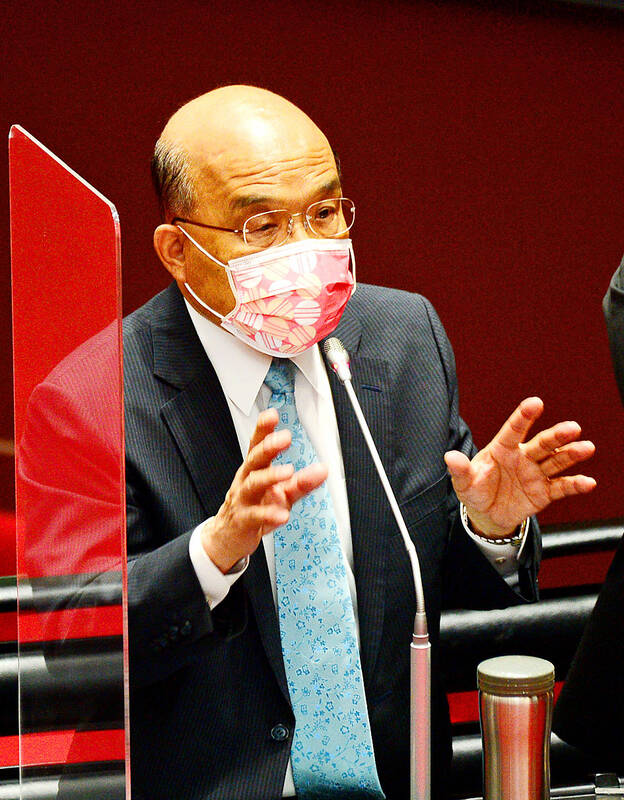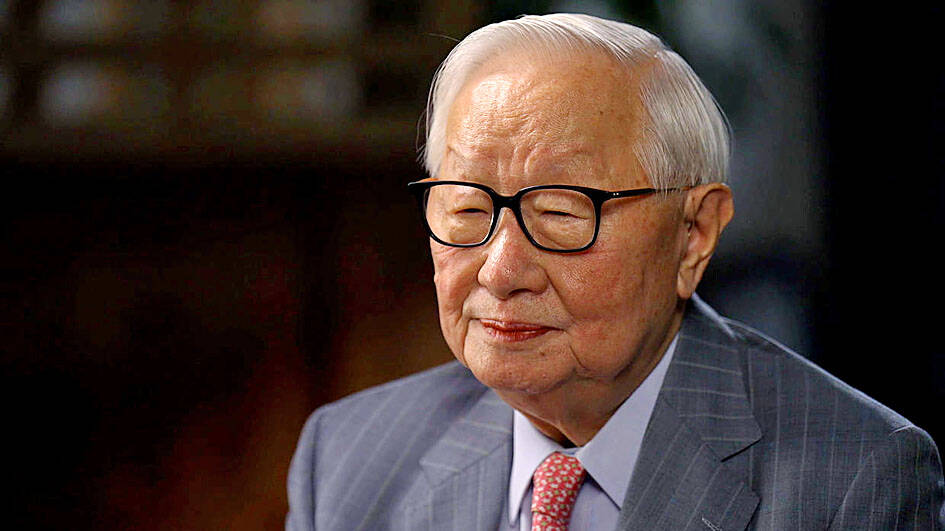Taiwan needs Taiwan Semiconductor Manufacturing Co (TSMC), but the company also needs a free and open country to allow it to develop, Premier Su Tseng-chang (蘇貞昌) said yesterday at the legislature.
The world also needs TSMC, and needs Taiwan to maintain its place in the global supply chain, he added.
The premier was responding to questions from legislators related to TSMC founder Morris Chang’s (張忠謀) comments broadcast on the US news program 60 Minutes on Monday.

Photo: Wang Yi-sung, Taipei Times
Speaking to reporter Lesley Stahl, Chang said that China would not attack Taiwan because TSMC is there.
When asked by Stahl what created the belief of the “silicon shield” or “chip shield,” Chang said: “It means that, perhaps, because our company provides many chips to the world, maybe somebody will refrain from attacking it, if that person’s priority is for economic well-being, I think they will refrain from attacking.”
After reiterating the remarks to Su, Chinese Nationalist Party (KMT) Legislator Hsieh Yi-feng (謝衣鳳) asked the premier what Taiwan would do if TSMC left the country.

Photo: Screen grab from CBS “60 Minutes”
The government is aware of the possibility that TSMC could move elsewhere, but as much as Taiwan needs it, the semiconductor firm needs a free and open country like Taiwan to expand and develop its technologies, Su said.
Chang said the US has extended an offer for TSMC to establish factories in the US, Su added.
To highlight TSMC’s commitment to Taiwan, Su cited a statement made by TSMC chairman Mark Liu (劉德音), who said in an interview with CNN’s Fareed Zakaria, broadcast on July 31, that no one would win in a Chinese invasion.
“Nobody can control TSMC by force, because TSMC runs such a sophisticated manufacturing facility,” Su cited Liu as saying.
Su then referred to Chang’s statements in the 60 Minutes interview regarding the chance that China might try to nationalize TSMC within its “one China” framework.
“If there is a war, it will be destroyed; everything will be destroyed,” Chang said.
This would prove ruinous for the semiconductor industry and microchip manufacturing industry worldwide, Su said.
TSMC was not built in a day, Su said, adding that the environment in Taiwan has allowed it to become the company it is today, showing the world what only Taiwan can provide.
TSMC’s success contributes significantly to why large manufacturers and companies seek to establish headquarters or research centers in Taiwan, Su said.
“The success of TSMC has made Taiwan globally visible and supported,” he added.

An essay competition jointly organized by a local writing society and a publisher affiliated with the Chinese Communist Party (CCP) might have contravened the Act Governing Relations Between the People of the Taiwan Area and the Mainland Area (臺灣地區與大陸地區人民關係條例), the Mainland Affairs Council (MAC) said on Thursday. “In this case, the partner organization is clearly an agency under the CCP’s Fujian Provincial Committee,” MAC Deputy Minister and spokesperson Liang Wen-chieh (梁文傑) said at a news briefing in Taipei. “It also involves bringing Taiwanese students to China with all-expenses-paid arrangements to attend award ceremonies and camps,” Liang said. Those two “characteristics” are typically sufficient

A magnitude 5.9 earthquake that struck about 33km off the coast of Hualien City was the "main shock" in a series of quakes in the area, with aftershocks expected over the next three days, the Central Weather Administration (CWA) said yesterday. Prior to the magnitude 5.9 quake shaking most of Taiwan at 6:53pm yesterday, six other earthquakes stronger than a magnitude of 4, starting with a magnitude 5.5 quake at 6:09pm, occurred in the area. CWA Seismological Center Director Wu Chien-fu (吳健富) confirmed that the quakes were all part of the same series and that the magnitude 5.5 temblor was

The Central Weather Administration has issued a heat alert for southeastern Taiwan, warning of temperatures as high as 36°C today, while alerting some coastal areas of strong winds later in the day. Kaohsiung’s Neimen District (內門) and Pingtung County’s Neipu Township (內埔) are under an orange heat alert, which warns of temperatures as high as 36°C for three consecutive days, the CWA said, citing southwest winds. The heat would also extend to Tainan’s Nansi (楠西) and Yujing (玉井) districts, as well as Pingtung’s Gaoshu (高樹), Yanpu (鹽埔) and Majia (瑪家) townships, it said, forecasting highs of up to 36°C in those areas

IN FULL SWING: Recall drives against lawmakers in Hualien, Taoyuan and Hsinchu have reached the second-stage threshold, the campaigners said Campaigners in a recall petition against Chinese Nationalist Party (KMT) Legislator Yen Kuan-heng (顏寬恒) in Taichung yesterday said their signature target is within sight, and that they need a big push to collect about 500 more signatures from locals to reach the second-stage threshold. Recall campaigns against KMT lawmakers Johnny Chiang (江啟臣), Yang Chiung-ying (楊瓊瓔) and Lo Ting-wei (羅廷瑋) are also close to the 10 percent threshold, and campaigners are mounting a final push this week. They need about 800 signatures against Chiang and about 2,000 against Yang. Campaigners seeking to recall Lo said they had reached the threshold figure over the